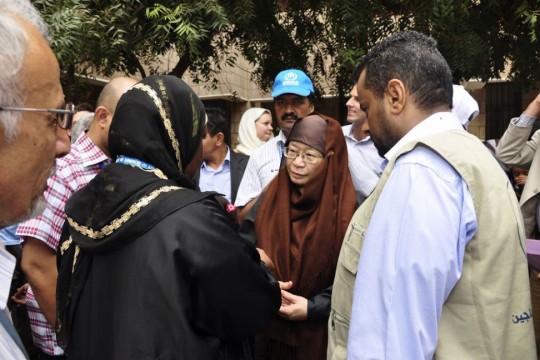Conflict and chronic poverty leave millions of Yemenis in need of relief – UN official
Conflict and chronic poverty leave millions of Yemenis in need of relief – UN official
Assistant Secretary-General Catherine Bragg (centre) meets UNHCR representatives working with IDPs and refugees in Aden, southern Yemen
Large segments of the population of Yemen are enduring chronic deprivation exacerbated by the breakdown of the delivery of essential social services as a result of civil unrest and widespread violence, a senior United Nations relief official who just returned from the country said today.
“We are seeing rates of malnutrition in young children comparable to those in Somalia,” said Catherine Bragg, the Assistant Secretary-General for Humanitarian Affairs, who completed a four-day mission to the country earlier this week.
“A third of the population… doesn’t know where their next meal is coming from, [amid] a looming health crisis,” Ms. Bragg, who is also the Deputy Relief Coordinator, told reporters at UN Headquarters.
She said scarcity of resources and the growing influx of refugees and migrants from the Horn of Africa have placed further strain on host communities, who are increasingly in need of assistance themselves, especially in the form of food, health care, sanitation and clean water.
Humanitarian agencies are requesting a total of $452 million for relief work in Yemen next year, a 35 per cent increase from this year. The funding will cover food and nutrition, water, sanitation and health and ensure that the most vulnerable people receive the assistance they need, Ms. Bragg said.
“In 2012, we and our partners will expand humanitarian programmes so that we can reach as many as possible of the 3.8 million people across Yemen needing life-saving aid. This figure includes internally displaced people, refugees, as well as the host communities,” she said.
She travelled to Aden in the south, Harad’h in the north, and the capital, Sana’a, to assess the crisis, discuss with partners ways of responding to the growing needs and ensure that the authorities understand the gravity of the situation.
Tens of thousands of people have been displaced by the fighting in Abyan Governorate in the south in recent months, she said, adding that most of the internally displaced persons (IDPs) are living with host families or in school buildings in Aden and neighbouring governorates.
“I spoke to the local authorities about the need to find lasting solutions for people sheltering in the schools. I also underlined the fact that humanitarian workers must have independent access to all areas where civilians are being displaced.”
In the north, about 300,000 people remain displaced by the conflict in Sa’ada. Many of them are unable to return to their homes because of insecurity, fear of retaliation, and loss of livelihoods and assets. Several aid agencies have had to reduce their presence because of threats made by armed groups, Ms. Bragg added.
In her meetings with Government officials, Ms. Bragg urged them to expedite procedures for issuing visas to international non-governmental organizations staff so that aid workers can set up operations in the country faster.
###
> United Nations (UN).
 The United Nations was established on 24 October 1945 by 51 countries committed to preserving peace through international cooperation and collective security. Today, nearly every nation in the world belongs to the UN: membership totals 192 countries.
The United Nations was established on 24 October 1945 by 51 countries committed to preserving peace through international cooperation and collective security. Today, nearly every nation in the world belongs to the UN: membership totals 192 countries.
When States become Members of the United Nations, they agree to accept the obligations of the UN Charter, an international treaty that sets out basic principles of international relations. According to the Charter, the UN has four purposes:
- to maintain international peace and security;
- to develop friendly relations among nations;
- to cooperate in solving international problems and in promoting respect for human rights;
- and to be a centre for harmonizing the actions of nations.
###
* The above story is adapted from materials provided by United Nations (UN)
** More information at United Nations (UN)





















